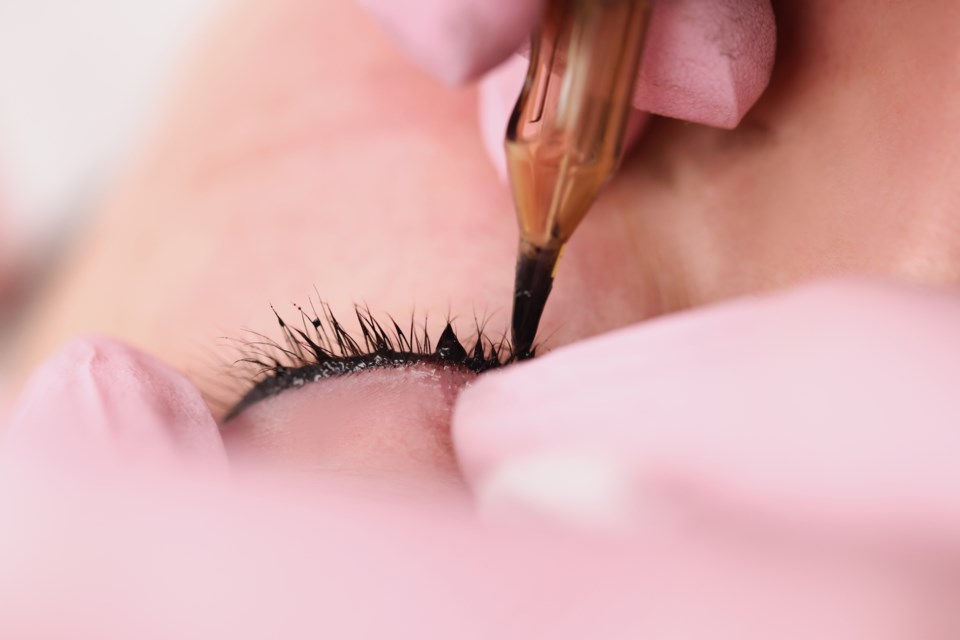A B.C. woman has lost her bid for $5,000 in damages as a result of a permanent eyeliner procedure she claimed had caused chemical burns.
Patricia Ward-Hall received the treatment from Mai Tuyet Thi Pham doing business as Apple Beauty Salon in Surrey, according to an Aug. 20 decision from the Civil Resolution Tribunal.
Ward-Hall claimed Pham negligently performed the eyeliner procedure which caused chemical burns to her eyes.
She sought $5,000 for damages, reimbursement for eyeliner treatment and for physiotherapy.
Tribunal member Mark Henderson said Ward-Hall went to Pham’s salon on Dec. 21, 2022.
Ward-Hall said that when she sat up from the procedure, all the ink bled into her eyes and immediately damaged both eyes with chemical burns.
Ward-Hall said she spent seven or eight hours in the salon waiting for the reaction to subside. She said she was diagnosed with chemical keratitis at White Rock’s Peace Arch Hospital.
She also alleged she suffered vertigo from stress and post-traumatic stress disorder (PTSD) from the experience.
Henderson said Ward-Hall provided copies of a medical record from the Peace Arch Hospital and from the ophthalmologist she saw on Dec. 22, 2022.
But, he added, Ward-Hall did not provide any medical records that diagnosed her with vertigo or PTSD after the procedure on Dec. 21, 2022.
Pham said she informed Ward-Hall of the risks — including mild redness and swelling for a few days — prior to the procedure.
Pham did not provide a copy of any release or waiver to notify Ward-Hall of the risks of the procedure, Henderson said.
“Mrs. Ward-Hall did not dispute that Mrs. Pham provided verbal information about the risks of the procedure,” he said. “So, I find that Mrs. Pham communicated these risks to Mrs. Ward-Hall verbally and not in writing.”
Pham said that during the procedure Ward-Hall was checked up multiple times and her eyelids were cleaned with single-use cotton pads soaked in distilled water to avoid ink bleeding into the eyes.
Pham said that the pigment is only applied to the outer skin of the eyelid and that the needle never touched Ward-Hall’s inner eyelid or eyeball.
“Mrs. Pham also said that Mrs. Ward-Hall repeatedly rubbed their eyes,” Henderson said. “Mrs. Pham advised Mrs. Ward-Hall not to rub their eyes as this would make the normal redness and irritation worse.”
Henderson said Ward-Hall’s claim is one of negligence. To establish such a claim, the tribunal said Ward-Hall had to prove that Pham owed her a duty of care, she breached the required standard of care, and that the breach caused Ward-Hall to suffer damages.
“I find that by providing permanent eyeliner services to Mrs. Ward-Hall, Mrs. Pham owed them a duty of care,” he said. “I find expert opinion evidence is necessary to establish Mrs. Pham’s required standard of care.”
However, he said, Ward-Hall did not provide any expert evidence to explain how Pham failed to meet the standard of care for a permanent eyeliner procedure.
“Mrs. Ward-Hall only provided evidence of the injury to her eyes and the ophthalmologist’s diagnosis,” he said.
“The injury does not prove that Mrs. Pham’s work was negligent,” Henderson said. “The ophthalmologist’s report does not say if the chemical burn was caused by an improper application procedure or by Mrs. Ward-Hall rubbing their eyes.”
The tribunal found Ward-Hall had not established Pham breached the standard of care and had not shown Pham was negligent.
“For these reasons, I dismiss Mrs. Ward-Hall’s claim and this dispute,” he wrote.



